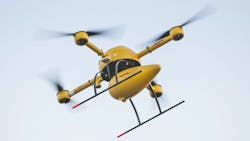Unmanned Parcelcopter Flies Meds to North Sea Island
For the first and only time in Europe, a flight by an unmanned aircraft will be operated outside of the pilot's field of vision in a real-life mission to deliver medications and other urgently needed goods. DHL Parcel will launch this unique pilot project on the North Sea island of Juist, delivering these goods at certain times of the day by DHL parcelcopter. This represents the next phase of the parcelcopter research project the company launched in December 2013.
Since that maiden flight, the DHL parcelcopter has been modified to perform this specific type of mission. The research team optimized such aspects as flight duration, flight range and speed to address the special challenges posed by the wind and marine-weather conditions of the North Sea.
"Our DHL parcelcopter 2.0 is already one of the safest and most reliable flight systems in its class that meets the requirements needed to fulfill such a mission," said Jürgen Gerdes, CEO of Deutsche Post DHL's Post - eCommerce - Parcel Division. "We are proud that this additional service can create added value for the residents of and visitors to the island of Juist and are pleased with the support we have received from the involved communities and agencies."
DHL Parcel worked with two research and development partners (the Institute of Flight System Dynamics at RWTH Aachen University and Microdrones GmbH), completing a comprehensive consultation and approval process led by Lower Saxony's Ministry for Economics, Labor and Transport. In coordination with DFS Deutsche Flugsicherung GmbH, the German Ministry of Transport and Digital Infrastructure has established a restricted flight area exclusively for this research project. In addition to the island of Juist and the city of Norden, the Wattenmeer national park administrative unit approved the parcelcopter flights.
The flight route to the island of Juist is roughly 12 kilometers. The flight will be completely automated for the first time. This means that a pilot does not have to take any action at all during any phase of the flight. For safety reasons and in compliance with the requirements set by the responsible agencies, the parcelcopter will be constantly monitored during the flight by a mobile ground station in Norddeich so that manual action can be immediately taken in real time if a malfunction or emergency occurs. The ground station will also maintain constant contact with air traffic controllers.
To ensure that the DHL parcelcopter operates reliably, flies safely and always lands at the right location, an autopilot with automated takeoff and landing functions was developed. At an altitude of 50 meters, the parcelcopter can travel up to 18 meters per second depending on wind speed. It will primarily transport medications from the mainland to the island of Juist at certain times during the week and on weekends. This delivery option will focus on times when such alternatives as ferries and flights are not available. The parcelcopter will take off from the harbor in Norddeich. It will land at a launch pad and landing field on the island of Juist reserved specifically for the parcelcopter. From there, a DHL courier will then deliver the goods to the recipient. To optimally secure the goods during transport, DHL Parcel developed a special air-transport container that is lightweight and weather- and waterproof.
Ordering medications on the island
The medications for the transport can be ordered from the research project's collaboration partner on Juist, Seehund pharmacy. Since the parcelcopter's first test flights, during which medications were transported from one bank of the Rhine River in Bonn to the other, DHL Parcel has proceeded forward with the research project and expanded collaboration with its research and development partners. The Institute for Flight System Dynamics at RWTH Aachen University is new to the project team. It focuses on the optimization, modeling, simulation and control of highly automated aircraft. One of the institute’s areas of specialization is the safe and robust operation of unmanned aircraft for very different missions under challenging environmental and weather conditions.
Another development partner is Microdrones GmbH, providers of automated copters. It has been involved in the project from the beginning and developed the DHL parcelcopter on the basis of one of its flight platforms.
DHL Parcel has no specific plans to use the parcelcopter in normal parcel delivery operations. This phase of the research project will test and evaluate the possibilities of such delivery methods. To the extent that it is technically feasible and economically sensible, the use of parcelcopters to deliver urgently needed goods to thinly populated or remote areas or in emergencies is considered an option for the future, the company says.
